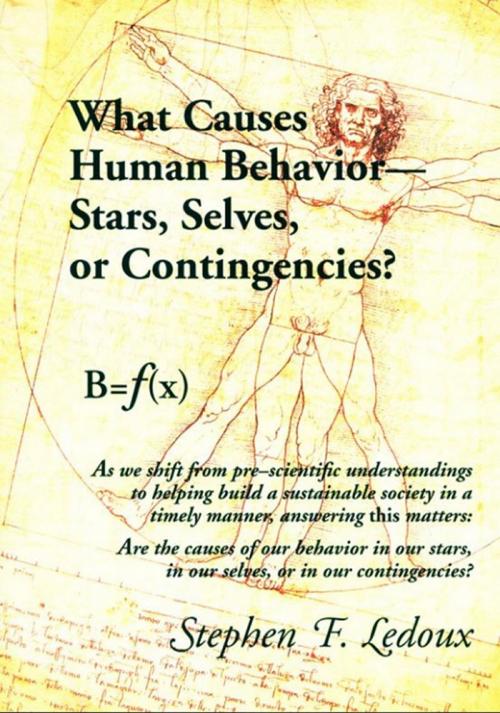What Causes Human Behavior
Stars, Selves, Or Contingencies?
Nonfiction, Home & Garden, Pets, Dogs, Science & Nature, Nature| Author: | Stephen F. Ledoux | ISBN: | 9781617812125 |
| Publisher: | Dogwise Publishing | Publication: | September 27, 2017 |
| Imprint: | BehaveTech Publishing | Language: | English |
| Author: | Stephen F. Ledoux |
| ISBN: | 9781617812125 |
| Publisher: | Dogwise Publishing |
| Publication: | September 27, 2017 |
| Imprint: | BehaveTech Publishing |
| Language: | English |
Making scientific sense of human behaviorVirtually everyone wants to know more about the causes of human behavior. Witness the large number of books related to this topic on the selfhelp and newage shelves in stores and online lists, with few if any naturalscience books among them. Over the last century, only a handful of books have approached the humanbehavior topic with natural science. Emphasizing plain English rather than technical jargon, this book considers human behavior for what natural science has to say about it, the natural science of human behavior. Like other natural sciences, this one investigates human behavior through experimental research, and applies the findings across every behavior related field, from fairadvertising to zookeeping, for humanity’s benefit.What Causes Human Behavior—Stars, Selves, or Contingencies? is written for anyone concerned to understand human behavior in general, or in a wide range of particular areas such as family life and interpersonal relations, education and the workplace, and cultural life and international relations. The scientific understanding of these areas also extends to the part human behavior and its causes play in solving local and global problems such as global warming, pollution, resource depletion, overpopulation and, dare we say it, human survival. For several decades, concerned people around the world, including traditional natural scientists such as physicists, chemists and biologists, have worked to improve and expand solutions to serious and growing global problems. This has led them to point out that both problems and solutions to these issues involve a large component of human behavior. Scientists are now realizing that making significant changes to human behavior, at all levels of society, to help solve such problems, requires that the natural science of human behavior—Behaviorology—be understood and applied to make truly lasting improvements.
Making scientific sense of human behaviorVirtually everyone wants to know more about the causes of human behavior. Witness the large number of books related to this topic on the selfhelp and newage shelves in stores and online lists, with few if any naturalscience books among them. Over the last century, only a handful of books have approached the humanbehavior topic with natural science. Emphasizing plain English rather than technical jargon, this book considers human behavior for what natural science has to say about it, the natural science of human behavior. Like other natural sciences, this one investigates human behavior through experimental research, and applies the findings across every behavior related field, from fairadvertising to zookeeping, for humanity’s benefit.What Causes Human Behavior—Stars, Selves, or Contingencies? is written for anyone concerned to understand human behavior in general, or in a wide range of particular areas such as family life and interpersonal relations, education and the workplace, and cultural life and international relations. The scientific understanding of these areas also extends to the part human behavior and its causes play in solving local and global problems such as global warming, pollution, resource depletion, overpopulation and, dare we say it, human survival. For several decades, concerned people around the world, including traditional natural scientists such as physicists, chemists and biologists, have worked to improve and expand solutions to serious and growing global problems. This has led them to point out that both problems and solutions to these issues involve a large component of human behavior. Scientists are now realizing that making significant changes to human behavior, at all levels of society, to help solve such problems, requires that the natural science of human behavior—Behaviorology—be understood and applied to make truly lasting improvements.















